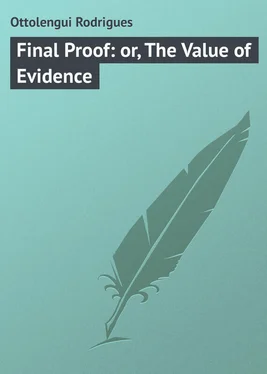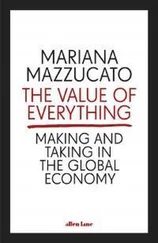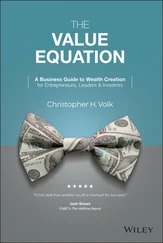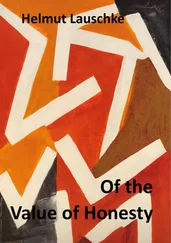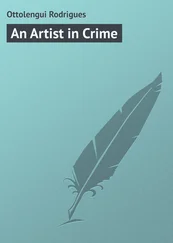Rodrigues Ottolengui - Final Proof - or, The Value of Evidence
Здесь есть возможность читать онлайн «Rodrigues Ottolengui - Final Proof - or, The Value of Evidence» — ознакомительный отрывок электронной книги совершенно бесплатно, а после прочтения отрывка купить полную версию. В некоторых случаях можно слушать аудио, скачать через торрент в формате fb2 и присутствует краткое содержание. Жанр: foreign_prose, на английском языке. Описание произведения, (предисловие) а так же отзывы посетителей доступны на портале библиотеки ЛибКат.
- Название:Final Proof: or, The Value of Evidence
- Автор:
- Жанр:
- Год:неизвестен
- ISBN:нет данных
- Рейтинг книги:3 / 5. Голосов: 1
-
Избранное:Добавить в избранное
- Отзывы:
-
Ваша оценка:
- 60
- 1
- 2
- 3
- 4
- 5
Final Proof: or, The Value of Evidence: краткое содержание, описание и аннотация
Предлагаем к чтению аннотацию, описание, краткое содержание или предисловие (зависит от того, что написал сам автор книги «Final Proof: or, The Value of Evidence»). Если вы не нашли необходимую информацию о книге — напишите в комментариях, мы постараемся отыскать её.
Final Proof: or, The Value of Evidence — читать онлайн ознакомительный отрывок
Ниже представлен текст книги, разбитый по страницам. Система сохранения места последней прочитанной страницы, позволяет с удобством читать онлайн бесплатно книгу «Final Proof: or, The Value of Evidence», без необходимости каждый раз заново искать на чём Вы остановились. Поставьте закладку, и сможете в любой момент перейти на страницу, на которой закончили чтение.
Интервал:
Закладка:
Ottolengui Rodrigues
Final Proof Or The Value of Evidence
PREFATORY
The first meeting between Mr. Barnes, the detective, and Robert Leroy Mitchel, the gentleman who imagines himself to be able to outdo detectives in their own line of work, was fully set forth in the narrative entitled An Artist in Crime . Subsequently the two men occupied themselves with the solution of a startling murder mystery, the details of which were recorded in The Crime of the Century . The present volume contains the history of several cases which attracted their attention in the interval between those already given to the world, the first having occured shortly after the termination of the events in An Artist in Crime , and the others in the order here given, so that in a sense these stories are continuous and interdependent.
R. O.I
THE PHŒNIX OF CRIME
Mr. Mitchel was still at breakfast one morning, when the card of Mr. Barnes was brought to him by his man Williams.
"Show Mr. Barnes in here," said he. "I imagine that he must be in a hurry to see me, else he would not call so early."
A few minutes later the detective entered, saying:
"It is very kind of you to let me come in without waiting. I hope that I am not intruding."
"Not at all. As to being kind, why I am kind to myself. I knew you must have something interesting on hand to bring you around so early, and I am proportionately curious; at the same time I hate to go without my coffee, and I do not like to drink it too fast, especially good coffee, and this is good, I assure you. Draw up and have a cup, for I observe that you came off in such a hurry this morning that you did not get any."
"Why, thank you, I will take some, but how do you know that I came off in a hurry and had no coffee at home? It seems to me that if you can tell that, you are becoming as clever as the famous Sherlock Holmes."
"Oh, no, indeed! You and I can hardly expect to be as shrewd as the detectives of romance. As to my guessing that you have had no coffee, that is not very troublesome. I notice three drops of milk on your coat, and one on your shoe, from which I deduce, first, that you have had no coffee, for a man who has his coffee in the morning is not apt to drink a glass of milk besides. Second, you must have left home in a hurry, or you would have had that coffee. Third, you took your glass of milk at the ferry-house of the Staten Island boat, probably finding that you had a minute to spare; this is evident because the milk spots on the tails of your frock-coat and on your shoe show that you were standing when you drank, and leaned over to avoid dripping the fluid on your clothes. Had you been seated, the coat tails would have been spread apart, and drippings would have fallen on your trousers. The fact that in spite of your precautions the accident did occur, and yet escaped your notice, is further proof, not only of your hurry, but also that your mind was abstracted, – absorbed no doubt with the difficult problem about which you have come to talk with me. How is my guess?"
"Correct in every detail. Sherlock Holmes could have done no better. But we will drop him and get down to my case, which, I assure you, is more astounding than any, either in fact or fiction, that has come to my knowledge."
"Go ahead! Your opening argument promises a good play. Proceed without further waste of words."
"First, then, let me ask you, have you read the morning's papers?"
"Just glanced through the death reports, but had gotten no further when you came in."
"There is one death report, then, that has escaped your attention, probably because the notice of it occupies three columns. It is another metropolitan mystery. Shall I read it to you? I glanced through it in bed this morning and found it so absorbing that, as you guessed, I hurried over here to discuss it with you, not stopping to get my breakfast."
"In that case you might better attack an egg or two, and let me read the article myself."
Mr. Mitchel took the paper from Mr. Barnes, who pointed out to him the article in question, which, under appropriate sensational headlines, read as follows:
"The account of a most astounding mystery is reported to-day for the first time, though the body of the deceased, now thought to have been murdered, was taken from the East River several days ago. The facts are as follows. On Tuesday last, at about six o'clock in the morning, several boys were enjoying an early swim in the river near Eighty-fifth Street, when one who had made a deep dive, on reaching the surface scrambled out of the water, evidently terrified. His companions crowded about him asking what he had seen, and to them he declared that there was a 'drownded man down there.' This caused the boys to lose all further desire to go into the water, and while they hastily scrambled into their clothes they discussed the situation, finally deciding that the proper course would be to notify the police, one boy, however, wiser than the others, declaring that he 'washed his hands of the affair' if they should do so, because he was not 'going to be held as no witness.' In true American fashion, nevertheless, the majority ruled, and in a body the boys marched to the station-house and reported their discovery. Detectives were sent to investigate, and after dragging the locality for half an hour the body of a man was drawn out of the water. The corpse was taken to the Morgue, and the customary red tape was slowly unwound. At first the police thought that it was a case of accidental drowning, no marks of violence having been found on the body, which had evidently been in the water but a few hours. Thus no special report of the case was made in the press. Circumstances have developed at the autopsy, however, which make it probable that New Yorkers are to be treated to another of the wonderful mysteries which occur all too frequently in the metropolis. The first point of significance is the fact, on which all the surgeons agree, that the man was dead when placed in the water. Secondly, the doctors claim that he died of disease, and not from any cause which would point to a crime. This conclusion seems highly improbable, for who would throw into the water the body of one who had died naturally, and with what object could such a singular course have been pursued? Indeed this claim of the doctors is so preposterous that a second examination of the body has been ordered, and will occur to-day, when several of our most prominent surgeons will be present. The third, and by far the most extraordinary circumstance, is the alleged identification of the corpse. It seems that one of the surgeons officiating at the first autopsy was attracted by a peculiar mark upon the face of the corpse. At first it was thought that this was merely a bruise caused by something striking the body while in the water, but a closer examination proved it to be a skin disease known as 'lichen.' It appears that there are several varieties of this disease, some of which are quite well known. That found on the face of the corpse, however, is a very rare form, only two other cases having been recorded in this country. This is a fact of the highest importance in relation to the events which have followed. Not unnaturally, the doctors became greatly interested. One of these, Dr. Elliot, the young surgeon who first examined it closely, having never seen any examples of lichen before, spoke of it that evening at a meeting of his medical society. Having looked up the literature relating to the disease in the interval, he was enabled to give the technical name of this very rare form of the disease. At this, another physician present arose, and declared that it seemed to him a most extraordinary coincidence that this case had been reported, for he himself had recently treated an exactly similar condition for a patient who had finally died, his death having occurred within a week.
Читать дальшеИнтервал:
Закладка:
Похожие книги на «Final Proof: or, The Value of Evidence»
Представляем Вашему вниманию похожие книги на «Final Proof: or, The Value of Evidence» списком для выбора. Мы отобрали схожую по названию и смыслу литературу в надежде предоставить читателям больше вариантов отыскать новые, интересные, ещё непрочитанные произведения.
Обсуждение, отзывы о книге «Final Proof: or, The Value of Evidence» и просто собственные мнения читателей. Оставьте ваши комментарии, напишите, что Вы думаете о произведении, его смысле или главных героях. Укажите что конкретно понравилось, а что нет, и почему Вы так считаете.
